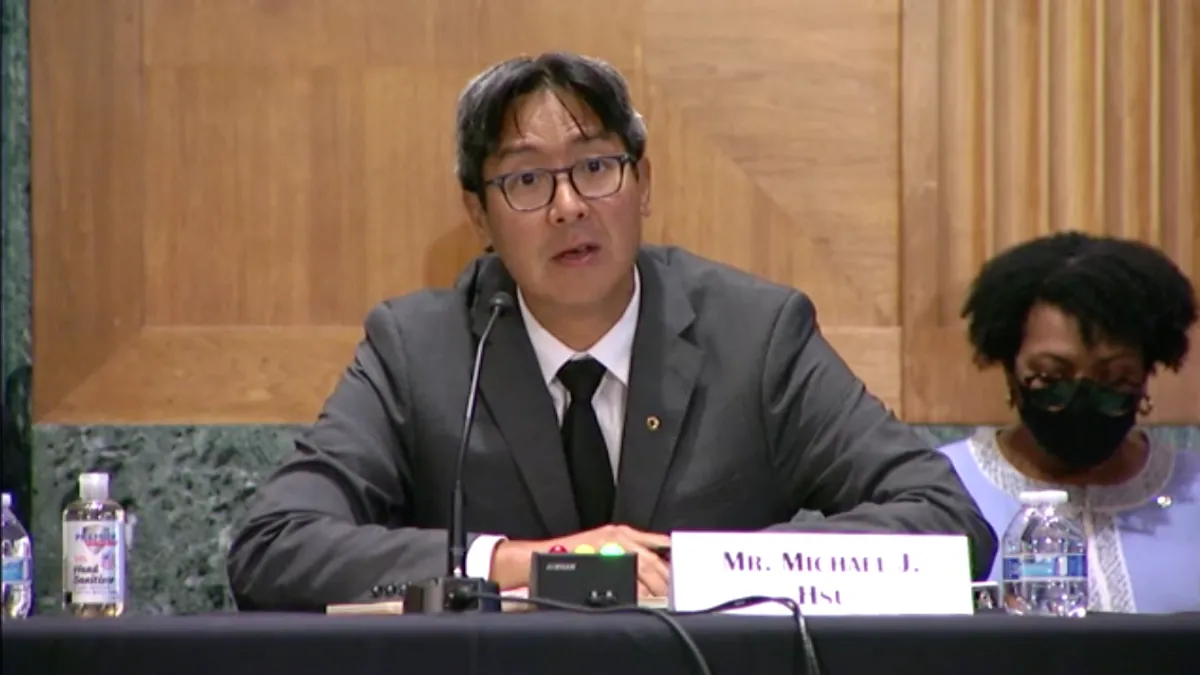Dive Brief:
- The Office of the Comptroller of the Currency (OCC) will cut assessment fees by 40% on a bank’s first $200 million in assets, starting in March, in a move meant to give banks “extra breathing space and capacity to invest and seize opportunities,” Acting Comptroller Michael Hsu said Thursday in a speech to the Texas Bankers Association.
- The regulator will also cut assessment fees by 20% on assets between $200 million and $20 billion.
- Hsu also said the OCC is working to revitalize de novo banking activity and keep its regulatory expectations of banks tailored to their size and complexity.
Dive Insight:
"The OCC is proactively working to close the pricing differential between state and federal charter assessments,” Hsu said. “The purpose of this adjustment is to level the playing field with the cost of supervision compared to state community bank charters.”
Community banks can expect to save $41.3 million in 2023 from the assessment reductions. Community banks “hold at least two-thirds of the deposits in more than 50 percent of counties,” Hsu noted, adding that their essentiality was highlighted during the pandemic — when, as of June 30, 2020, they held 41% of $198 million of the Paycheck Protection Program (PPP) loan market.
Midsize and large banks will also experience relief, the OCC noted, seeing $11.1 million and $18.8 million in savings next year, respectively.
Relief from the fees, which are charged semiannually in March and September and based in part on a bank’s size, will give the banks "extra breathing space and capacity to invest and seize opportunities related to digitalization, compliance, cybersecurity, and personnel,” the OCC said.
This is the fourth time the OCC has cut assessment fees in as many years, following a 3% cut last year and 10% each in 2019 and 2020. Hsu said the cuts wouldn’t influence the quality of OCC supervision.
The OCC is also working to revitalize de novo banking activity — which Hsu said has been dormant “for years” — by streamlining community bank licensing and coordinating with the Federal Deposit Insurance Corp. (FDIC) and Federal Reserve. Hsu added that the OCC understands the need to tailor its regulatory expectations for banks based on their size and complexity.
“All too often, we hear concerns from community bankers that large bank requirements should not trickle down to smaller banks and that such requirements can be excessive and tie up scarce personnel and other resources,” he said. “The OCC will remain diligent in guarding against such outcomes.”
Community banks can use some of the money they’re saving through the assessment reductions on digitalization, which Hsu highlighted as the top long-term challenge and opportunity facing the industry.
“Incorporating a thoughtful digitalization strategy within a bank’s strategic business plan can lead to more efficient operations, better products and services for existing customers, and more competitive offerings for future customers,” he said.
One of the challenges presented in digitalization is leveling the playing field between banks and nonbanks, Hsu said.
“My experiences in the 2008 financial crisis taught me about the disastrous consequences that can result from an unlevel playing field where regulatory arbitrage and races to the bottom are allowed to fester,” Hsu said. “Under my tenure as acting comptroller, the OCC is requiring fintechs seeking a bank charter to be subject to the same requirements as all national banks, and we are engaging with our peer agencies to limit regulatory arbitrage.”













